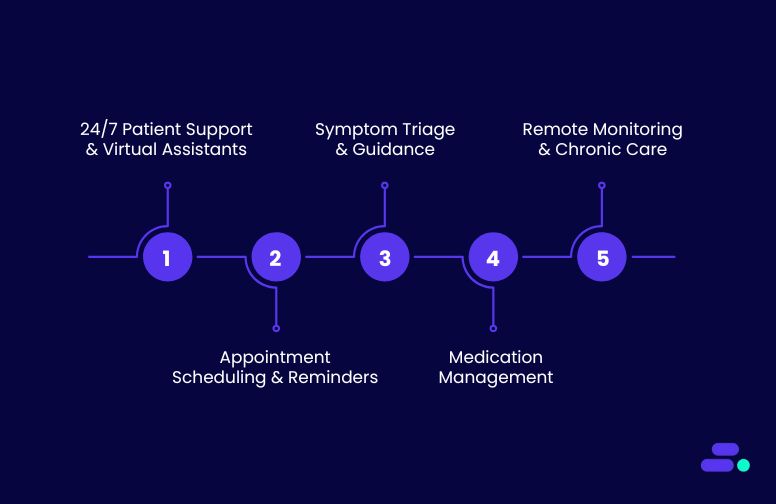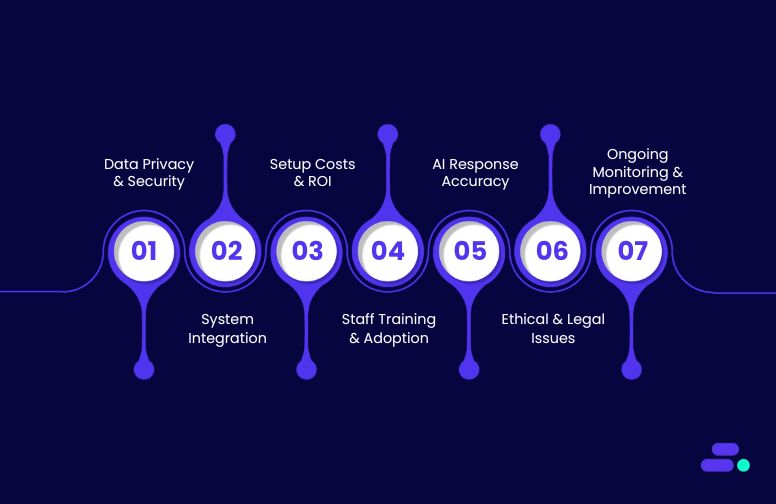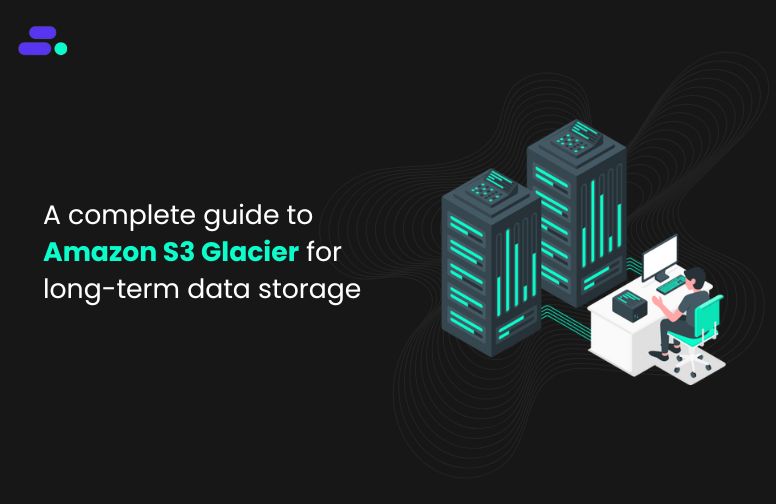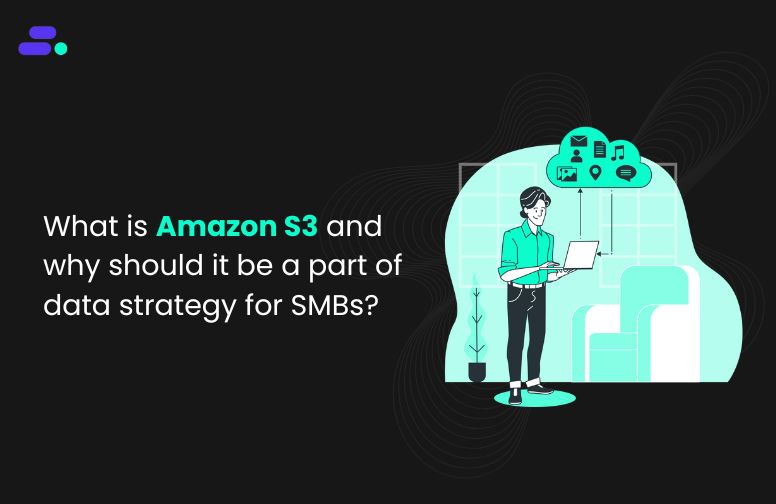This is a div block with a Webflow interaction that will be triggered when the heading is in the view.

Modernize your cloud. Maximize business impact.
Data usually lives across scattered spreadsheets, outdated databases, and disconnected applications. It’s “good enough” until a single error slips through, and suddenly reports don’t match, customers get the wrong invoices, or compliance deadlines are missed.
Think of an online retailer preparing quarterly tax filings. A small mismatch between sales records and payment processor data can force hours of manual reconciliation. Orders are delayed, finance teams scramble, and leadership questions whether the numbers can be trusted. Without a reliable data foundation, every decision becomes a gamble.
This article explores why data integrity is critical for SMB success, the early warning signs of trouble, and how AWS-powered best practices can help businesses safeguard their most valuable asset, which is data.
Key takeaways:
- Data integrity is a growth enabler, not just a compliance requirement: For SMBs, reliable data directly supports smarter decision-making, stronger customer relationships, and scalable operations.
- Inaccurate or inconsistent data creates hidden costs: From operational inefficiencies to lost sales opportunities, poor data quality can quietly erode profitability.
- Automation is the foundation of sustainable data accuracy: AWS-powered tools can validate, clean, and standardize data continuously, reducing the risk of human error.
- Data governance must be ongoing, not a one-time cleanup: Policies, monitoring, and regular audits ensure data quality remains high as the business grows and evolves.
- Cloudtech offers SMB-ready, AWS-based solutions that deliver results from day one: Its approach turns messy, unreliable datasets into trusted business assets that drive competitive advantage.
Why is it important for SMBs to ensure data integrity?
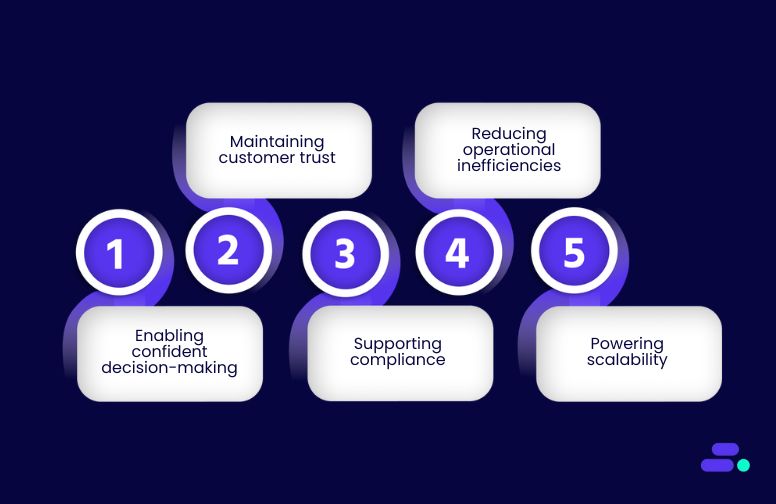
Data is the pulse of any business. Sales forecasts, customer records, compliance reports, and inventory data all feed critical decisions every day. When that data is incomplete, inconsistent, or inaccurate, even well-intentioned decisions can backfire.
Unlike large enterprises with dedicated data governance teams, SMBs often rely on lean teams juggling multiple roles. That makes them more vulnerable to unnoticed errors, missing records, or conflicting reports. The result? Wasted time on manual checks, missed opportunities, and in some cases, compliance penalties that strain already-tight budgets.
Strong data integrity protects SMBs by:
- Enabling confident decision-making: Leaders can act quickly, knowing the insights they’re using are reliable.
- Maintaining customer trust: Accurate data ensures orders, billing, and communications are error-free, reinforcing credibility.
- Supporting compliance: For industries like healthcare, finance, or retail, maintaining integrity helps avoid fines and legal issues.
- Reducing operational inefficiencies: Teams spend less time fixing errors and more time focusing on growth and innovation.
- Powering scalability: As the business grows, clean and consistent data prevents systems from becoming bottlenecks.
For SMBs, data integrity isn’t a “nice to have.” It’s the difference between steering the business with a clear view ahead or driving blindfolded and hoping for the best.

Common indicators of data integrity problems and how to solve them before escalation?
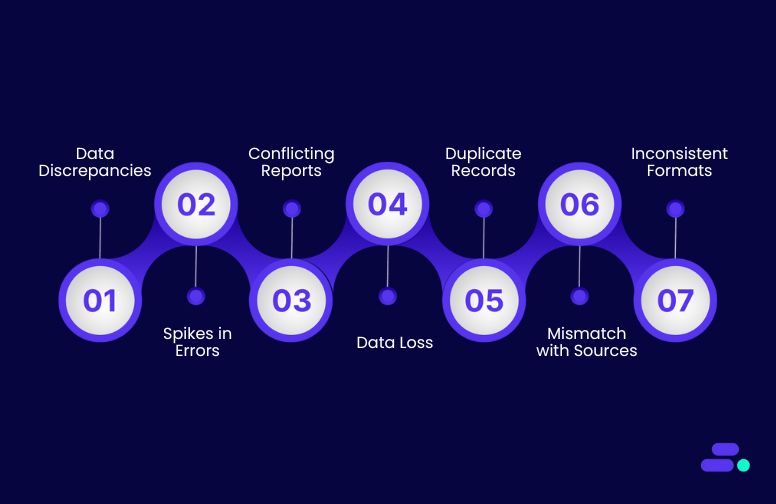
The absence of a structured approach to managing data integrity leads to mismatched records, duplicate entries, and reports that can’t be trusted. Systems might function fine on their own, but when information moves between departments or applications, cracks appear, causing errors that slip past unnoticed until they affect customers, compliance, or revenue.
With the right data integrity strategy, every record flows through the business accurately, consistently, and securely. Errors are caught early, discrepancies are resolved automatically, and teams spend less time firefighting and more time driving growth.
AWS empowers SMBs to achieve this by combining automated validation, secure access controls, and integrated data pipelines. For growing businesses, this shift turns data from a fragile liability into a dependable asset, and the following techniques outline how to spot early warning signs and address them before they escalate into costly problems.
1. Frequent data discrepancies across systems
When the same data appears differently across business systems, such as customer details in a CRM not matching billing records, it’s a red flag for data integrity. For SMBs, where teams rely on multiple interconnected tools, even small mismatches can lead to incorrect invoices, duplicate communications, compliance issues, or lost sales opportunities. Discrepancies often creep in unnoticed, only to surface when they cause financial or reputational damage.
What this problem means for data integrity:
- Breakdown in synchronization: Data changes in one system are not consistently updated in others, causing misalignment.
- Faulty or missing integrations: APIs, middleware, or connectors fail, resulting in incomplete or delayed data transfers.
- Manual entry vulnerabilities: Human errors during manual updates introduce inconsistencies that spread through dependent processes.
How to resolve the problem: The solution begins with creating a single source of truth and enabling real-time synchronization across systems. AWS Glue can serve as the central ETL (extract, transform, load) service to unify, clean, and map data between applications.
For direct, low-code integrations, Amazon AppFlow connects SaaS platforms (like Salesforce, Zendesk, or QuickBooks) with AWS data stores, ensuring that changes made in one system automatically propagate to others. By combining AWS Glue for transformation and AppFlow for live synchronization, SMBs can eliminate manual updates and maintain consistent records across their ecosystem.
2. Unexpected spikes in data errors or rejections
When a sudden surge of invalid inputs or failed data loads appears in logs or monitoring dashboards, it signals a serious data integrity concern. For SMBs, this can mean critical records never make it into reporting systems, customer orders fail mid-process, or compliance-related datasets are incomplete.
These errors often surface during peak operational periods, exactly when the business can least afford delays, and can stem from overlooked validation gaps, system updates, or integration failures.
What this problem means for data integrity:
- Broken validation rules: Existing checks for accuracy, completeness, or formatting may be outdated or disabled, letting bad data in.
- Misconfigured workflows: Data pipelines or ETL processes may be processing fields incorrectly, causing rejections further downstream.
- Inconsistent input standards: When source systems send data in unexpected formats, the receiving system fails to process it correctly.
How to resolve the problem: The fix starts with automated validation at the point of ingestion to stop bad data before it spreads. AWS Glue DataBrew allows teams to visually profile, clean, and standardize incoming datasets without deep coding expertise.
For real-time validation, AWS Lambda functions can be triggered as data enters the pipeline, applying rules to catch and quarantine invalid records. By pairing these tools, SMBs can ensure that only clean, usable data moves forward, while errors are logged and flagged for quick correction.
3. Reports showing conflicting results
When two dashboards or reports, designed to reflect the same KPIs, produce different numbers, it’s a clear warning sign of underlying data integrity issues. For SMBs, these discrepancies erode confidence in decision-making, cause teams to question the accuracy of their analytics, and can lead to costly misaligned strategies.
The root problem often lies in how data is aggregated, when it’s refreshed, or whether reporting tools are referencing the same source of truth.
What this problem means for data integrity:
- Inconsistent aggregation logic: Different formulas or grouping rules between reporting tools can produce mismatched results.
- Outdated or stale queries: Reports may be pulling data from outdated extracts or snapshots, missing the latest updates.
- Mismatched timeframes: Differences in how “periods” are defined, e.g., fiscal vs. calendar weeks, can skew comparisons.
How to resolve the problem: The first step is to centralize and standardize reporting logic so that all tools reference the same definitions, filters, and calculations. Amazon Redshift can serve as a high-performance, centralized data warehouse, ensuring analytics queries always pull from a single, consistent dataset.
For more advanced governance, AWS Lake Formation allows SMBs to define granular permissions and schema consistency rules, making sure all reporting systems align with the same trusted data source. This ensures that regardless of which dashboard is used, the numbers match, restoring confidence in analytics-driven decisions.

4. Unexplained data loss or missing records
When critical data records vanish without explanation, whether it’s customer orders disappearing from a database or entire time periods missing from analytics, it signals a serious data integrity risk.
For SMBs, these gaps can disrupt operations, distort reporting, and create compliance headaches if regulatory records are incomplete. Left unresolved, missing data can also undermine trust with customers and partners who depend on accurate, verifiable information.
What this problem means for data integrity:
- Failed ETL or ingestion jobs: Interrupted pipelines prevent new data from being captured or processed.
- Storage corruption or overwrites: Data in storage may be accidentally deleted, overwritten, or corrupted due to misconfigurations or hardware failures.
- Inadequate backup or recovery processes: Without versioning or robust backups, lost data cannot be restored.
How to resolve the problem: Begin by implementing automated monitoring and alerts for ETL processes using Amazon CloudWatch to detect and notify teams of failures in real time.
For protection against data loss, enable versioning in Amazon S3 to retain historical object copies, or use AWS Backup to create scheduled, resilient backups of critical datasets. By pairing real-time job monitoring with redundant, restorable storage, SMBs can minimize the risk of permanent data loss and recover quickly when issues arise.
5. Duplicate records increasing over time
When customer, product, or transaction records appear multiple times across databases, the impact on data integrity is more serious than it might seem. For SMBs, duplicate records can inflate metrics, cause conflicting analytics results, and even lead to embarrassing errors like sending multiple promotional emails to the same customer.
Over time, the problem compounds, making it harder to identify the “single source of truth” and creating friction in customer interactions.
What this problem means for data integrity:
- Erosion of trust in data accuracy: Stakeholders begin to question the validity of reports and dashboards.
- Operational inefficiency: Sales, support, or marketing teams waste time reconciling conflicting records.
- Customer experience risks: Duplicate outreach or incorrect personalization damages brand credibility.
How to resolve the problem: Use AWS Glue with deduplication scripts to systematically identify and merge records based on defined matching rules, such as unique IDs, email addresses, or a combination of attributes. For relational databases, Amazon RDS queries can help flag and remove duplicate entries at the table level.
By scheduling automated deduplication jobs and enforcing strict data entry validation rules at ingestion points, SMBs can maintain a clean, reliable dataset without relying solely on manual cleanup.
6. Data not matching external sources
When the numbers inside an SMB’s systems don’t align with authoritative external datasets, such as supplier price lists, regulatory compliance databases, or partner inventory feeds, the business is effectively working with a distorted reality.
Decisions based on this inaccurate information can cause financial losses, compliance violations, or strained supplier relationships. The problem often stems from outdated refresh cycles, broken integrations, or inconsistent mapping between data fields.
What this problem means for data integrity:
- Outdated operational decisions: Teams may make purchasing or pricing decisions based on obsolete or incomplete information.
- Compliance and reputational risks: Regulatory filings or audits may fail if internal records don’t match official data sources.
- Breakdown in partner trust: Discrepancies with supplier or partner systems can lead to disputes or penalties.
How to resolve the problem: Set up automated, scheduled data refresh pipelines using AWS Data Pipeline or AWS Step Functions to ensure consistent synchronization with external sources. Combine these with AWS Glue to transform and map incoming data into the correct internal formats before it’s stored.
For real-time updates, Amazon AppFlow can integrate directly with external SaaS platforms, ensuring data freshness without manual intervention. Implement monitoring with Amazon CloudWatch to detect failed syncs early, minimizing the window for discrepancies to grow.
7. Inconsistent data formats across records
When records store the same type of information in multiple formats, such as “2025-08-13” vs. “13/08/2025” for dates, “USD 100” vs. “$100” for currency, or “lbs” vs. “kg” for weight, data analysis quickly turns into a guessing game.
These inconsistencies cause errors in calculations, slow down reporting, and make integration with other systems cumbersome. They also erode trust in the accuracy of outputs since users can’t be certain the data was aggregated or interpreted correctly.
What this problem means for data integrity:
- Inaccurate analytics outputs: Queries and reports may miscalculate totals, averages, or trends due to incompatible formats.
- Integration failures: Downstream systems consuming the data may reject records or misinterpret values.
- Higher operational costs: Data cleaning and reformatting become ongoing manual tasks, diverting resources from more strategic work.
How to resolve the problem: Enforce standardized schemas across datasets using AWS Glue Data Catalog to define field-level formats for every table. Apply format normalization during data ingestion using AWS Glue ETL jobs or AWS Lambda functions triggered via Amazon S3 events.
For datasets sourced from multiple origins, implement a transformation layer that converts all incoming values into a unified format before storage, ensuring analytics tools and integrations consume consistent, clean data. Monitoring jobs with Amazon CloudWatch ensures that any new non-standard entries are detected early and corrected automatically.

The road to data reliability can seem steep for SMBs with smaller teams, but Cloudtech makes it a smooth climb. Its AWS-certified experts design resilient data pipelines that ensure every piece of information is accurate, synchronized, and ready for action.
How does Cloudtech make AWS data integrity achievable for SMBs?
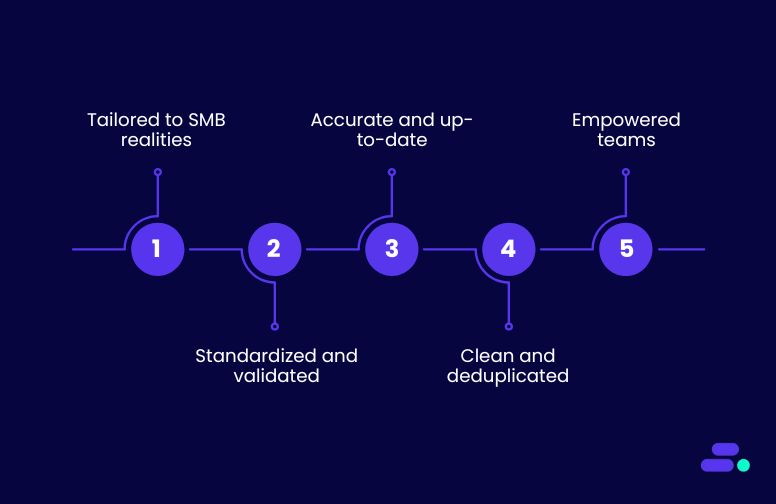
Poor data quality can slow decisions, cause compliance headaches, and undermine customer trust. AWS-powered data integrity solutions change that by ensuring every record is accurate, consistent, and reliable across the business. Cloudtech, as an AWS Advanced Tier Services Partner built exclusively for SMBs, makes sure this foundation is solid from day one.
Instead of patching issues reactively, Cloudtech builds end-to-end, cloud-native data pipelines that are resilient, compliant, and easy to maintain. Here’s how that works:
- Tailored to SMB realities: From initial data assessment to ongoing monitoring, Cloudtech delivers right-sized data governance strategies that fit lean teams, removing unnecessary complexity while maintaining high standards.
- Standardized and validated: Using AWS Glue Data Catalog, format normalization scripts, and schema enforcement, data stays consistent—whether it’s coming from internal apps or external sources.
- Accurate and up-to-date: Scheduled refresh pipelines with AWS Step Functions or AWS Data Pipeline keep records in sync with trusted external datasets, eliminating drift over time.
- Clean and deduplicated: Regular quality checks with AWS Glue deduplication jobs or targeted Amazon RDS queries remove duplicates before they can impact analytics or reporting.
- Empowered teams: Training, clear documentation, and best-practice playbooks give SMBs the tools to maintain data integrity independently, without relying on constant outside intervention.
With Cloudtech, SMBs don’t just fix data issues, they build a trustworthy, automated data ecosystem that strengthens every decision they make.
See how other SMBs have modernized, scaled, and thrived with Cloudtech’s support →

Wrapping up
Reliable data is more than an operational asset for SMBs. It’s the backbone of informed decision-making and sustainable growth. True data integrity ensures that every record is consistent, accurate, and trustworthy, no matter the source or format.
Cloudtech, with its AWS-certified expertise and SMB-first approach, helps businesses build and maintain that foundation. By combining automated validation, real-time synchronization, and robust governance practices, Cloudtech ensures data remains dependable while teams focus on innovation and customer value.
With Cloudtech’s AWS-powered data integrity solutions in place, SMBs can operate with clarity, confidence, and agility, turning data from a liability risk into a competitive edge. Discover how it can help your business protect, optimize, and unlock the full potential of its data—connect with the Cloudtech team today.
FAQs
1. How does poor data integrity affect customer trust?
When SMBs rely on inaccurate or outdated records, it often results in incorrect order details, mismatched invoices, or miscommunication with clients. Over time, these errors can lead customers to question the company’s professionalism and reliability. Even one visible mistake, like sending the wrong shipment, can undo months or years of relationship-building. For SMBs, where personal service is often a key differentiator, maintaining data integrity is essential to sustaining customer loyalty.
2. Can data integrity issues slow down decision-making?
Absolutely. Leaders need quick access to reliable information to make timely business decisions. When the accuracy of reports is in doubt, teams are forced to cross-check multiple systems, verify figures manually, and reconcile discrepancies before moving forward. This slows strategic initiatives, delays operational responses, and sometimes results in missed opportunities, especially in competitive markets where speed is critical.
3. Is improving data integrity a one-time project or an ongoing process?
Data integrity is never a “set-and-forget” project. While an initial cleanup or modernization effort can resolve existing issues, SMBs face ongoing risks as new data is collected daily from different sources. Systems evolve, integrations change, and regulations shift. Maintaining integrity requires continuous monitoring, automated validations, and a governance framework that ensures quality remains high as the business grows.
4. How can SMBs prevent human error from impacting data integrity?
Human error is one of the most common causes of data issues, whether through duplicate entries, typos, or incomplete information. Cloudtech helps SMBs address this by designing AWS-based automation that reduces the need for manual inputs. For example, AWS Glue can standardize and transform incoming data automatically, while AWS Step Functions can ensure every process step is validated before moving forward. This not only improves accuracy but also speeds up operations.
5. Does better data integrity have a direct impact on revenue?
While the effect is often indirect, the financial benefits are real. Reliable data enables more accurate sales forecasting, better inventory management, and improved targeting in marketing campaigns. Fewer errors mean fewer returns, disputes, or wasted resources. Over time, these efficiencies add up, allowing SMBs to reinvest savings into growth initiatives while building a stronger, more trustworthy brand presence in the market.

Get started on your cloud modernization journey today!
Let Cloudtech build a modern AWS infrastructure that’s right for your business.

